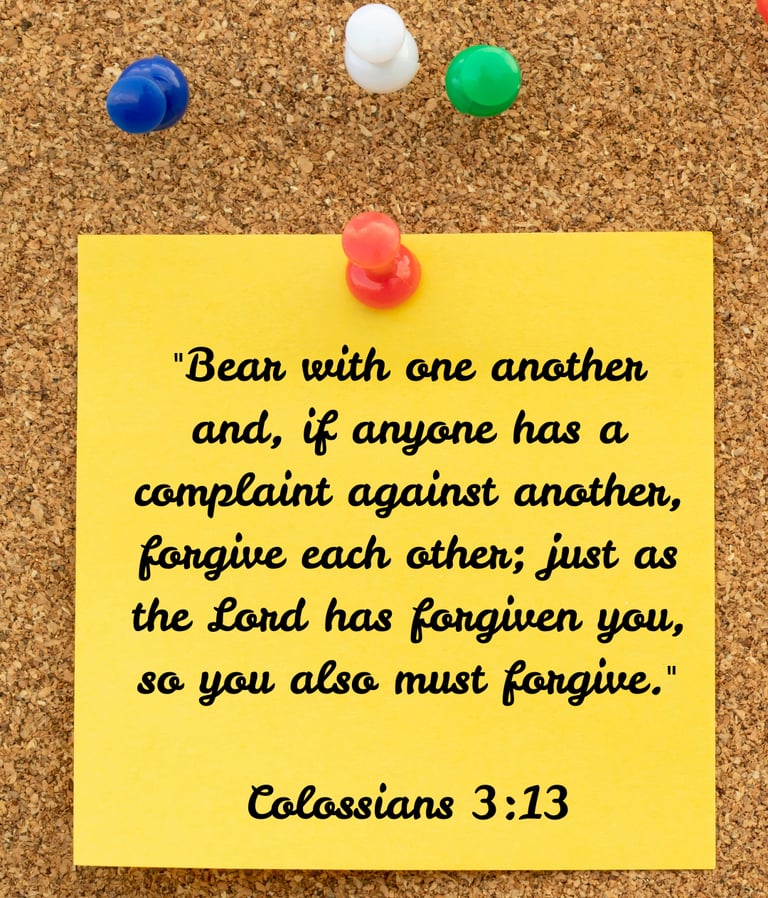The Gift of Forgiveness: Finding Healing and Peace
Forgiving those who hurt us is never easy. But it’s a choice that sets our hearts free. In this blog post, I reflect on how choosing to forgive, just as God has forgiven us of our sins, can lead to healing and finding peace.
HEALING GRACES & REFLECTIONS
Sheri Anne Maximille Cabañes-Madayag
7/4/20256 min read


Have you held onto anger or resentment towards someone who hurt you?
It could be someone who betrayed your trust. Someone said hurtful words that cut so deep. Or a person who left without saying a word.
Even a small reminder of that person or the hurtful act continues to trigger the pain from the wounds you thought had healed. If this sounds like you, know that you're not alone.
I, too, had my fair share of getting hurt by the people I once trusted and loved. I carried the weight of resentment for years. After years of holding on and praying for the pain to go away, I've come to realize something. I needed to forgive them to free myself from the resentment that had held me back.
Join me in this blog post as I reflect on why forgiveness is a gift you can give not to the people who hurt you, but to yourself.
A Glimpse of What’s Inside This Reflection:
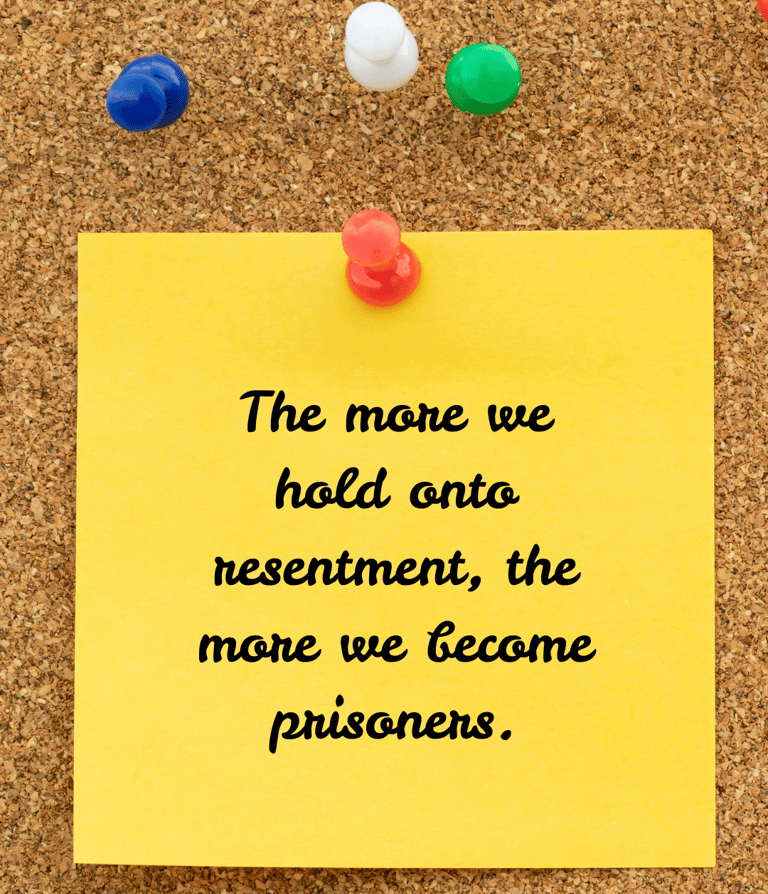

The Prison of Resentment
Resentment, as defined by Merriam-Webster, is a feeling of indignant displeasure or persistent ill will at something regarded as wrong, insult, or injury.
It's natural to feel angry and hurt when someone wrongs us. Feelings like anger and resentment are valid and understandable. These feelings are part of what makes us human.
While feelings of resentment are normal, holding onto them will only make things worse. When we keep playing a hurtful moment in our minds, resentment consumes our thoughts. It gets rooted in our hearts and takes over our lives. It robs us of our peace. It steals our joy. The more we hold onto resentment, the more we become prisoners.
The irony of it is that the person who hurt us may not be aware of the pain they caused us. They probably did not care if what they said or did hurt us. They might think everything is okay because we still see or talk to them regularly. Or maybe, they have moved on with their lives. And these can make us feel more resentful.
As we remain trapped in our prison of resentment, we continue to punish ourselves for another person's wrongdoings. This is the sad truth about unforgiveness and holding onto resentment.
Forgiveness Is Not for Them—It’s for You
The old saying, "forgive and forget", suggests that we should completely let go of the anger as if the offense never happened. Others would argue to "forgive but never forget". This means we can forgive the person who hurt us, but never forget the hurtful act. Regardless of whether we choose to "forgive and forget" or "forgive but never forget", we can all agree that forgiveness is not an easy thing to do.
It is not easy to forgive, especially if the person who hurt us did not even say "sorry" or show any remorse for hurting us. We don't need to wait for an apology. Because the longer we wait, the more we prolong the agony of being imprisoned in resentment. Forgiveness is a process, and it takes time. But choosing to forgive can bring us closer to letting go of the hurt, so we can move forward.
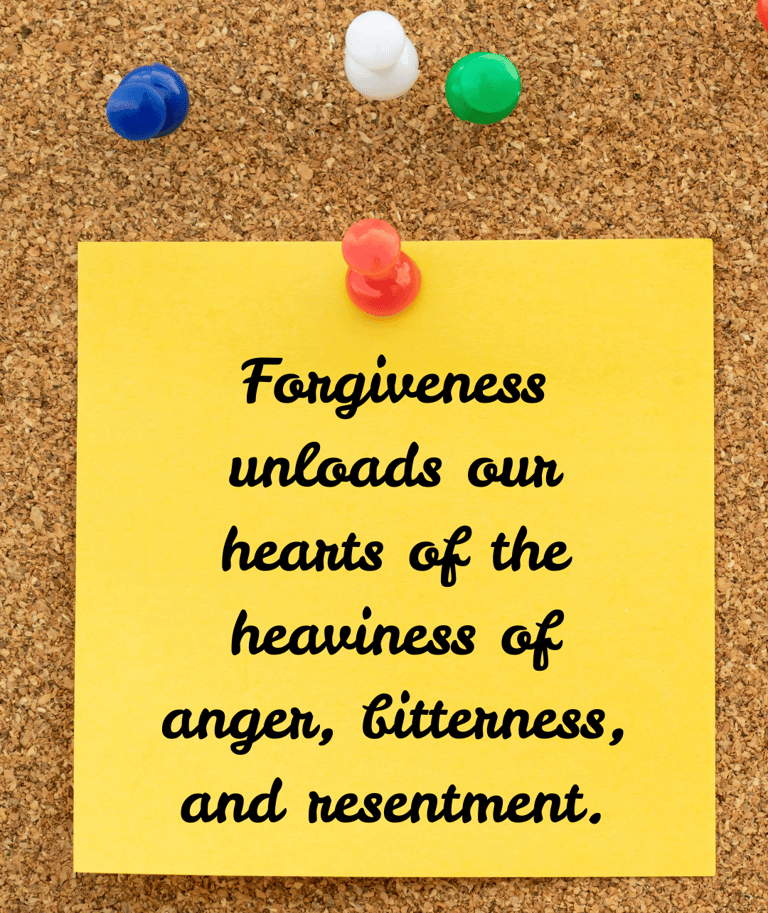

Forgiveness does not mean that it was okay for the person to hurt us. It also doesn't mean pretending everything is alright. We don't need to disregard our hurt feelings. And we don't even need to restore our relationship with that person.
Forgiveness is a conscious and heartfelt decision we make for ourselves. It is a powerful act of letting go. It's choosing freedom from the chains of bitterness and the prison of resentment. It's giving yourself the gift of healing and peace.
The moment we choose to forgive, our hearts will be free. It's like unloading a heavy backpack of things we didn't need, making it lighter to carry. It's like decluttering our closet of old worn-out clothes, making room for those that provide warmth and comfort. Forgiveness unloads our hearts of the heaviness of anger, bitterness, and resentment. As a result, our hearts feel lighter and more open to receiving love, peace, and joy.
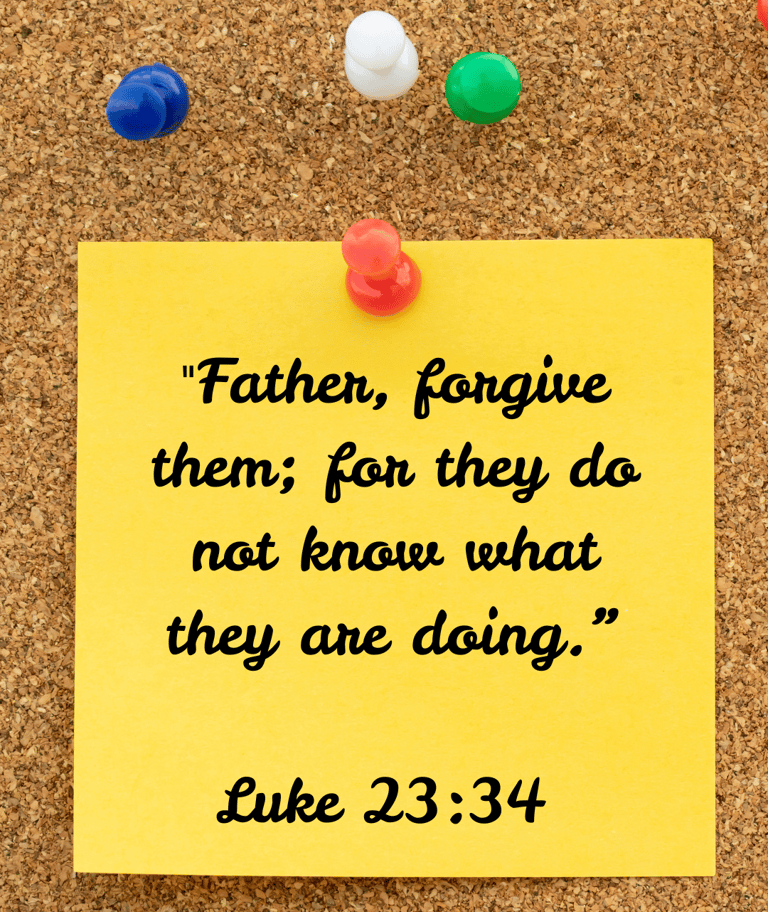

The Ultimate Gift of Forgiveness
We all have offended or hurt someone in some way, intentional or not. We are far from perfect. We all commit sins and make mistakes. Despite all these, we have received the ultimate gift of forgiveness.
This is a beautiful truth: God forgives us of our sins even if we are unworthy of His grace. He gave us Jesus to die on the cross to save us from our sins. While suffering on the cross, Jesus asked God the Father to forgive us our sins. In Luke 23:34, Jesus said, "Father, forgive them; for they do not know what they are doing.”
We are all unworthy sinners. But God forgives us freely even if we repeatedly commit sins. Then, who are we to withhold forgiveness from those who sinned against us?
Let God Bring Justice
In our society, a system is in place to bring justice to those who break the law. We have police officers, lawyers, judges, a jury, and courts. They all work to catch and punish lawbreakers to serve justice to the victims.
We, too, hope that those who have hurt us will be brought to justice. In some instances, we even try to hurt them back as a form of revenge. We don't want them to simply "get away with it". But trying to seek revenge only adds to the burden of holding onto resentment. It makes it harder for us to forgive.
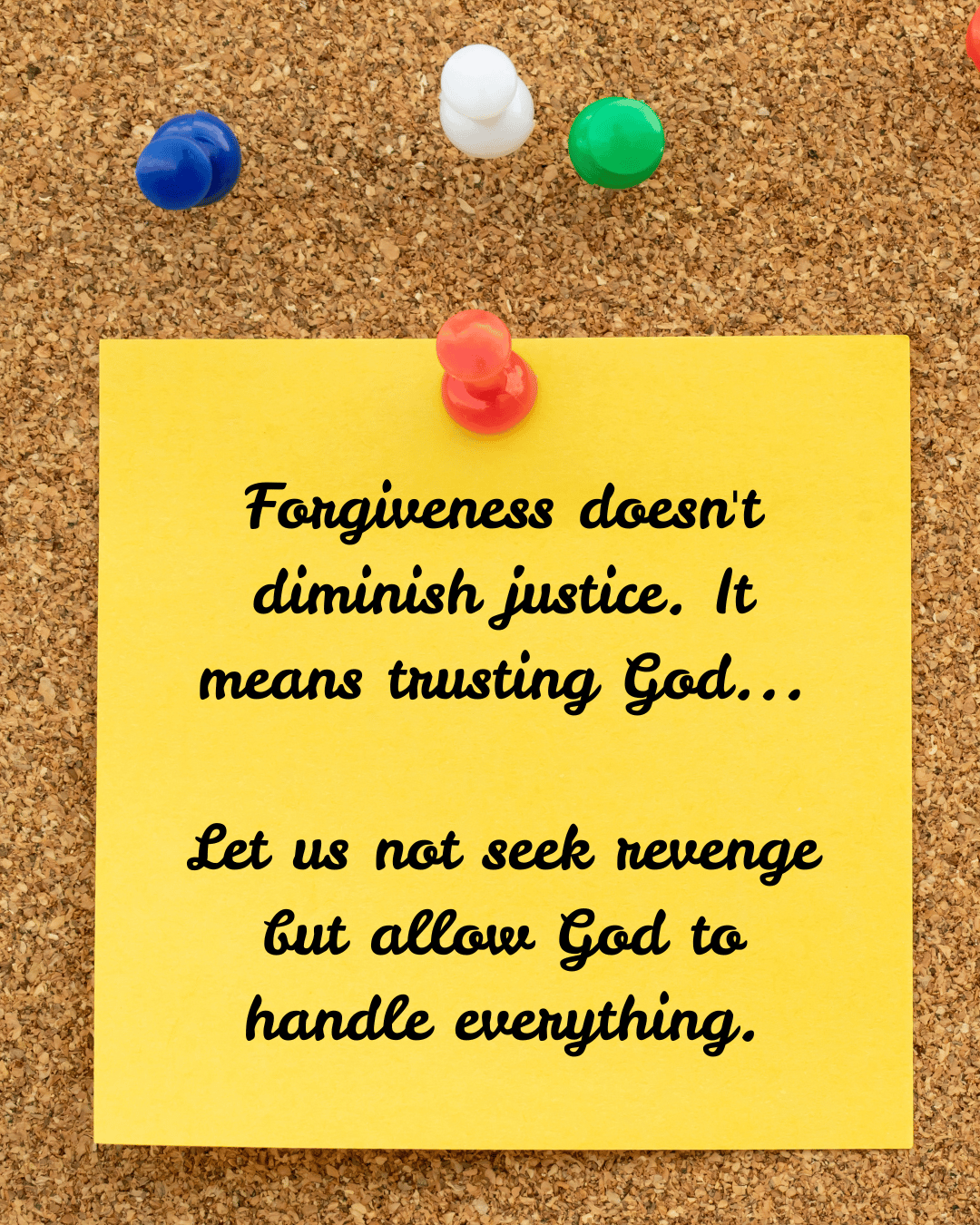

God is fair and just. He does not want us to seek revenge. As mentioned in Romans 12:19, "Beloved, never avenge yourselves, but leave room for the wrath of God; for it is written, 'Vengeance is mine, I will repay, says the Lord.'”
Forgiveness doesn't diminish justice. It means trusting God. He sees and knows everything. He will bring justice to those who have hurt us, in His way and in His time. Let us not seek revenge but allow God to handle everything.
Taking the Step Towards Forgiveness
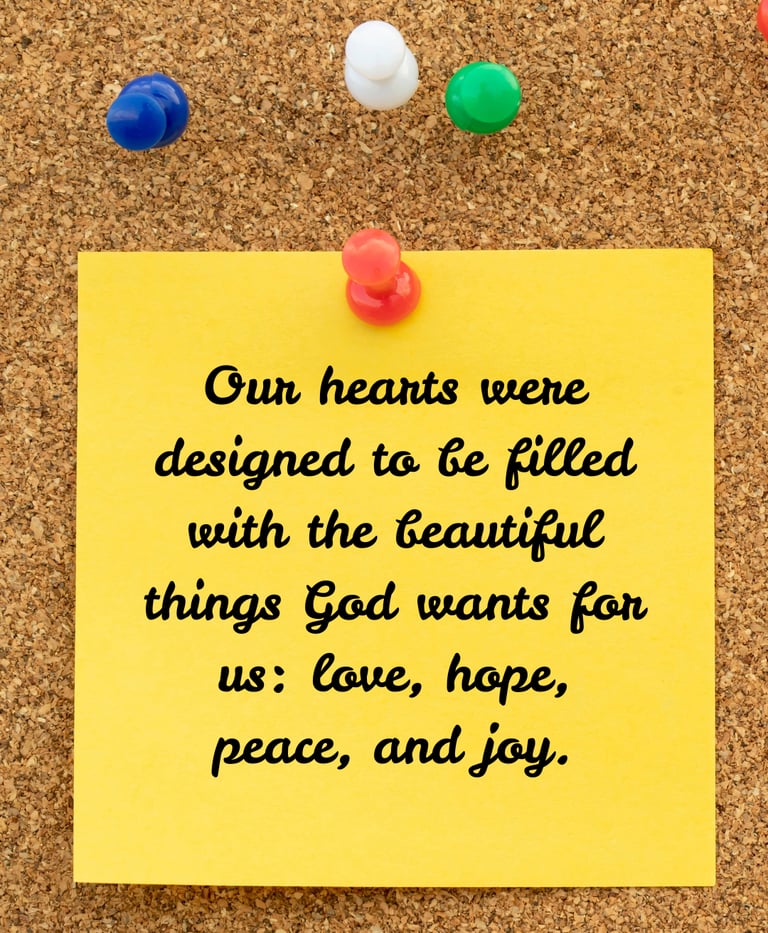

Choosing to forgive is not an easy decision. But it is the first step towards healing and freedom. It is refusing to let others' actions control your emotions and affect your well-being. When you choose to forgive, you choose to free your heart from resentment.
Our hearts were not meant to hold grudges and resentment for other people's wrongs. Our hearts were designed to be filled with the beautiful things God wants for us: love, hope, peace, and joy. What we fill our hearts with is what we will bring to the world. If our hearts are filled with hatred and anger, we give the same to the people around us. Filling it with love and kindness allows us to radiate love and kindness towards others.
We can start by praying to ask God for strength and wisdom to forgive. Let us allow Him to carry the weight of resentment we've been holding on to for so long. We should always trust that He is in control of everything. He will guide us through the process of forgiving others.
As a gentle reminder that God wants us to forgive, here is a verse from Colossians 3:13: "Bear with one another and, if anyone has a complaint against another, forgive each other; just as the Lord has forgiven you, so you also must forgive."
Have you been holding on to bitterness or anger? Or maybe you've recently forgiven someone who hurt you.
I'd be happy to hear your thoughts and journey on forgiving others.
Feel free to reach out through my contact page.
